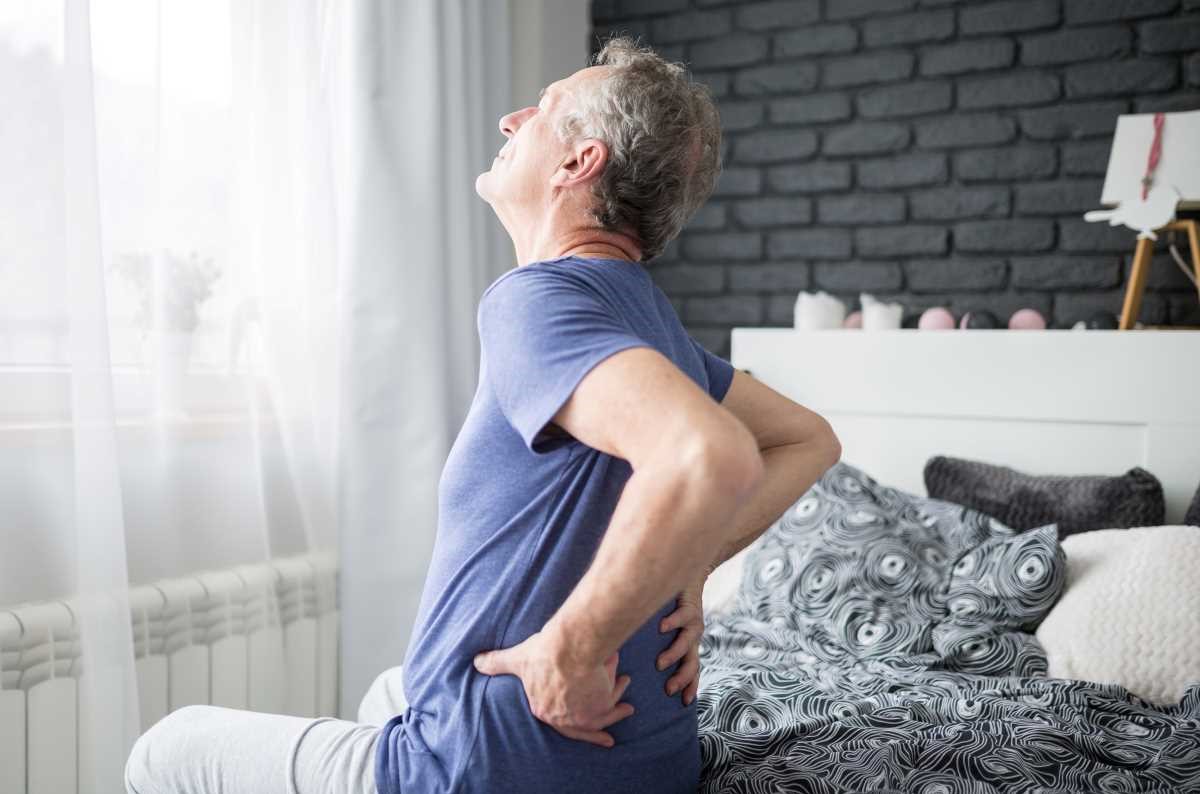Dealing with pain, isolation and loneliness
When you’re unwell or in pain – both physical and emotional – it’s natural to want to shut out the world and retreat to the cosy safety of your ‘cocoon’.
For me, it’s either my bed or the couch, soft, warm clothes, the doona if it’s cold and something mindless on the TV. I shut everything out and stay in my cocoon until I feel ready to face the world again.
This is my safe place, where I can minimise the risk that anything will exacerbate my pain or make me feel worse – because if I can’t control the pain, at least I can control my environment.
I’m not alone in this behaviour. It’s a common thing to do, especially when you live with a chronic condition and pain.
In our recent report: Making the invisible visible: Australians share the impact of musculoskeletal conditions on their lives people revealed that:
- They tended to keep to themselves and not contact friends and family when they’re feeling unwell – 64%
- Their ability to socialise with friends and family was impacted by their condition – 66%
- Their condition impacted their ability to participate in family events and activities – 35%
- They couldn’t make firm commitments to socialise – 45%
- They often needed to cancel plans due to their condition – 39%.
These findings highlight that living with the unpredictability of a musculoskeletal condition can significantly affect the social fabric of people’s lives.
Did you know: social isolation can have negative effects on our health? Research has shown that people who become isolated and experience loneliness are at increased risk of developing depression, having poor sleep, decreased immune function, poor cardiovascular health and impaired executive function.
So while retreating to your cocoon can be a soothing and healing thing to do for short periods, it can be harmful if you do it for too long and become cut off and isolated.
Why do we become isolated?
Pain and fatigue – These are the two big ones. When you can barely drag yourself out of bed, and just the thought of showering sounds exhausting, getting dressed and catching up with people can seem impossible.
Mental and emotional health – When you’re not feeling like your usual self and feel sad, depressed, anxious or down, it can affect your ability or willingness to make the effort to be social.
Losing touch or connection with friends and family – We lose touch with people for a variety of reasons. But sadly, sometimes we lose touch with people because we have to cancel or postpone plans when we’re not feeling well. And because of the unpredictable nature of musculoskeletal conditions, this can often happen at the last minute. If someone doesn’t know what it’s like to live with a chronic condition, they may find this frustrating and difficult to understand. As one person stated in our survey: “the worst part is they are invisible conditions, so people can’t understand unless they’ve had it.”
COVID-19 hasn’t helped – Physical distancing, lockdowns, closed borders and feeling vulnerable at the thought of being exposed to a new virus, especially if you already have a weakened immune system, has made many of us feel more isolated.
Emerging from the cocoon
But we’re social creatures and need interaction with others, even when we’re in pain. So we need to emerge from our safe, secure cocoons before isolation becomes problematic. Here are some tips to help.
Know yourself – We all live with different musculoskeletal conditions and health conditions. And they affect us physically, mentally and emotionally in differing ways. That means you’re the best person to judge how much time alone is good for you, and how much is detrimental. So know your limits.
Be honest with your important peeps – Most people don’t know what living with pain, brain fog or energy-sapping fatigue is like. So be open and honest with your family and close friends. Let them know why you sometimes need to cancel plans or need time alone to recharge. Don’t downplay how you’re feeling or make excuses. Just be honest.
Do things on your terms – If you’re feeling fragile and your cocoon (aka couch) is beckoning, think about how you can still interact with your people, but on your terms.
- Invite them to your house – for a coffee and chat, or get some yummy food delivered and have a meal together. And don’t worry if your home is untidy. Your people are there to see you, not your space. Just enjoy the time together.
- Call or have a video chat – you can do that from the comfort of your home. And COVID has taught us that as long as your top half is respectable, no one can see you’re wearing flannelette pyjama pants covered in rubber ducks.
- Go to a venue or on an outing that suits your symptoms, pain levels and how you’re feeling. Go to the local café, watch the latest blockbuster at the cinema, go for a slow meander in the park and find a park bench to sit and chat. Whatever works best for you.
Acknowledge the important people in your life – Set alerts on your phone or mark the dates in your diary and contact them on the significant days in their life – birthdays, anniversaries, starting a new job, Tuesdays. By setting up alerts, or having regular days and times to call, you’re less likely to miss the important life events we all hold dear or fall out of touch. And it means that even if you have a foggy brain at times, you won’t miss those dates.
The power of pets – Having a furry, feathered or scaled companion or two can help you feel less isolated, especially if you live alone. Their presence gives you a reason to get out of bed every day as they’re depending on you for food, water, exercise and cuddles. And they’re just so cute and comforting. They also give you something in common with the other 61% of Australians who own a dog, cat, fish, bird, snake, hamster, or lizard…that’s a lot of people you could potentially talk with – in person or online – about a shared love of animals.
Connect with others – We get a lot of our human connections and friendships through work, sporting clubs, book clubs, volunteering, parents groups etc. So try and keep these connections going, even if you’re not feeling 100%. Along with the connections of those nearest and dearest to us, they add a diverse richness that makes life so interesting. And if you’re not involved in any groups or clubs, consider joining one. Now’s the perfect time, as many are meeting online because of COVID. It allows you to dip your toe in the water and see what the group is like, from the comfort of your home.
Look after yourself – Ok, you’ve made it out the door, and you’ve been having a lovely time with friends. But you can feel your back starting to hurt. A lot. Uh-oh…what to do? Don’t ignore it. Whip out any of your trusty pain management techniques that you know work for you…such as stretching, walking, taking your medications, using a heat pack, distraction, and moving. Whatever works for you (obviously, this will depend on where you are and what facilities you have access to). The point is, by taking action, you’ll hopefully nip the worst of the pain in the bud. It also means that you were able to enjoy time with friends – despite your pain.
Cherish your alone time – This may sound weird after pushing you out the door, but it’s essential that we all take some time out when we need it. It gives you the time to relax, rest, recharge and reset.
“Humans are social beings, and we are happier, and better, when connected to others.” – Paul Bloom
However, sometimes our condition can make socialising difficult and even painful. But if you’re prepared and you know yourself and your limits, you’ll be in a good position to enjoy the rich, wonderful connections that make life so satisfying.
“The struggle to leave the cocoon is what strengthens the butterfly’s wings so she can fly. I am about to become something beautiful.” Tricia Stirling.
Contact our free national Help Line
If you have questions about things like managing your pain, your musculoskeletal condition, treatment options, mental health issues, COVID-19, telehealth, or accessing services be sure to call our nurses. They’re available weekdays between 9am-5pm on 1800 263 265; email (helpline@msk.org.au) or via Messenger.
More to explore
- The impact of social isolation on pain interference: A longitudinal study / Nicholas V Karayannis et al.
Annals of Behavioral Medicine, 53 (1), January 2019, Pages 65–74. - What is loneliness and how can we overcome it during these times?
Black Dog Institute - Loneliness and isolation
Lifeline - Head to Health
Australian Government - Pain Link Helpline
Australian Pain Management Association
The Pain Link Helpline provides information and support to people living with unrelieved pain and its impacts. Volunteers clarify issues, assist with action planning, provide practical tips, refer to appropriate services and listen to your needs to ease the impacts of pain.

















